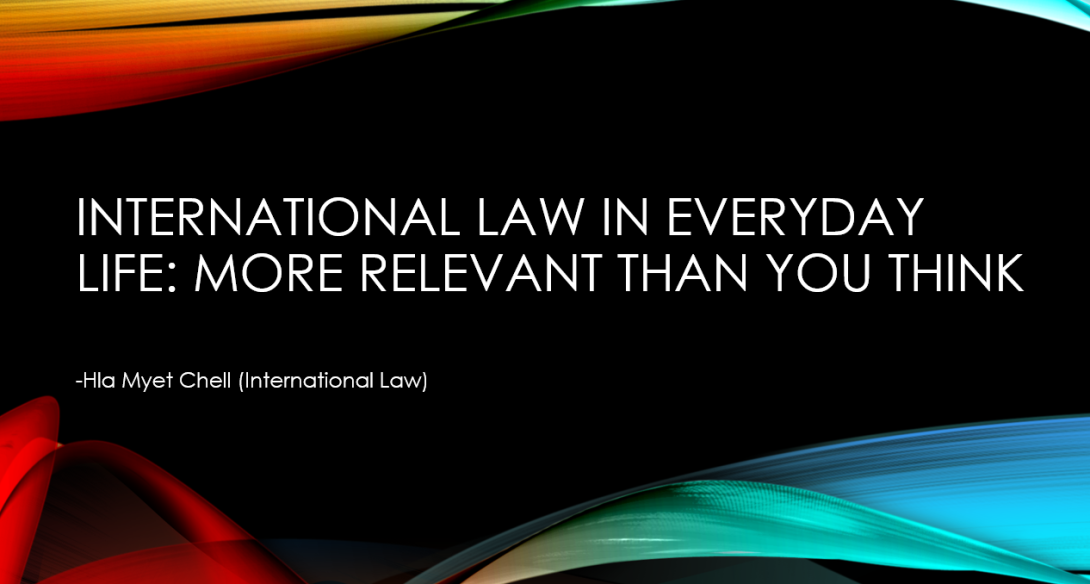International Law in Everyday Life: More Relevant Than You Think
Posted_Date
Image

Body
When you hear the term “international law,” what comes to mind? Perhaps you picture diplomats in suits, sitting in grand conference halls, signing treaties that seem distant from your daily life. Or maybe you imagine high-stakes cases at the International Court of Justice (ICJ), where nations argue over territorial disputes and human rights violations.
But what if I told you that international law isn’t just something that happens in faraway places, affecting only politicians and legal scholars? It’s actually woven into the fabric of your everyday life—in ways you might not even realize. From the coffee you sip in the morning to the social media platforms you browse before bed, international law is quietly shaping the modern world, ensuring that systems run smoothly and fairly. Let’s take a closer look at how international law shows up in your daily routine.
1. Morning Coffee and Global Trade
Picture this: you wake up, stumble to the kitchen, and make yourself a cup of coffee. That simple act is already tied to international law.
The coffee beans in your cup might have come from Brazil, Ethiopia, or Vietnam. How did they get to your local store? Through a complex network of trade agreements regulated by the World Trade Organization (WTO). The WTO sets the rules on tariffs, trade barriers, and import/export standards, making it possible for those coffee beans to travel across borders without excessive costs or political interference.
Even the logo on your coffee cup is protected by international law. Intellectual property agreements, such as the Agreement on Trade-Related Aspects of Intellectual Property Rights (TRIPS), protect the brand identity and trademarks of coffee companies, ensuring that you know you're drinking the real thing and not a knock-off.
Next time you take a sip of your morning brew, you might want to thank international law for making it possible.
2. Traveling Abroad: Passports and Visas
Planning a trip abroad? Your passport and visa requirements are shaped by international agreements.
Why can you travel to some countries visa-free but need a visa for others? That’s because of bilateral and multilateral agreements between countries, which determine the terms of entry for foreign nationals. The design and security of your passport are also regulated by the International Civil Aviation Organization (ICAO), a specialized agency of the United Nations. The ICAO sets global standards to prevent fraud and ensure smooth border crossings.
The ease of booking a flight and checking in at the airport is also governed by international aviation laws. The Chicago Convention on International Civil Aviation (1944) established the legal framework for air travel, ensuring that planes from one country can safely land in another.
So, the next time you breeze through passport control, remember that international law helped pave the way.
3. Environmental Protection and Climate Change
Ever wondered why plastic straws have disappeared from your favorite café? Or why countries are switching to renewable energy sources? That’s international law in action.
The Paris Agreement (2015), signed by nearly every country in the world, sets targets for reducing carbon emissions and combating climate change. This agreement pushes governments to adopt sustainable practices—like banning single-use plastics or investing in green energy—which directly impacts your daily life.
International treaties also protect wildlife and natural resources. The Convention on International Trade in Endangered Species of Wild Fauna and Flora (CITES) regulates the global trade of endangered animals and plants, ensuring that species are not exploited to extinction.
Even the beauty industry is influenced by international environmental standards. Take Selena Gomez’s Rare Beauty lipstick, for example. A portion of the proceeds from certain shades goes toward coral reef restoration efforts. Coral reefs are essential for marine biodiversity, but they are threatened by ocean warming and pollution. International environmental laws and agreements, like the United Nations Convention on the Law of the Sea (UNCLOS), aim to protect marine ecosystems and promote sustainable use of ocean resources.
So next time you apply that perfect shade of coral lipstick, remember that you’re not just enhancing your look—you’re supporting global efforts to protect the planet’s ecosystems.
4. Online Shopping and Consumer Protection
Clicked "Buy Now" on Amazon or Temu recently? Your online purchase is more connected to international law than you think.
International trade agreements ensure that goods can be imported and exported across borders efficiently. The General Agreement on Tariffs and Trade (GATT) sets the framework for international commerce, ensuring fair trade practices and reducing trade barriers.
Consumer protection laws, including intellectual property agreements, also protect you from counterfeit products and fraud. Cybersecurity agreements between countries work behind the scenes to protect your personal data when you enter your credit card details online.
So next time your package arrives at your door, remember that international law helped make it possible—safely and legally.
5. Health and Global Pandemics
The COVID-19 pandemic showed us just how interconnected the world is—and how crucial international cooperation is in times of crisis.
The World Health Organization (WHO) plays a key role in coordinating global health responses. Its regulations on disease reporting and health emergencies ensure that outbreaks are tracked and managed quickly. The WHO also works with governments and pharmaceutical companies to ensure that vaccines and treatments are distributed fairly.
International law also governs medical research and the sharing of scientific data. Agreements like the Nagoya Protocol regulate the use of genetic resources, ensuring that the benefits of medical discoveries are shared globally.
From vaccine rollouts to international travel restrictions, global health law shapes how the world responds to public health emergencies—protecting you and your community.
6. Social Media and Digital Privacy
Scrolling through Facebook or TikTok? Even social media is shaped by international law.
Data privacy regulations like the General Data Protection Regulation (GDPR) in the European Union set standards for how social media companies collect, store, and use your personal information. Many platforms follow these guidelines globally, which means that your data is protected even if you're not in the EU.
International agreements on cybercrime also regulate how governments respond to hacking, misinformation, and online threats. Your ability to use social media freely and safely is, in part, the result of international legal frameworks that protect online expression and privacy.
Why It Matters
International law isn’t just about treaties and court cases—it’s about the invisible rules that make modern life possible. It ensures that you can trade, travel, shop, and communicate across borders with confidence and security.
The next time you enjoy a cup of coffee, buy something online, or book a flight, or put on a lipstick, remember that international law is working behind the scenes. It’s not just the domain of diplomats and lawyers—it’s part of the rhythm of everyday life.
Understanding international law helps you see the world differently. It shows you how interconnected and interdependent we all are—and why cooperation between nations matters more than ever.
So, the next time someone mentions international law, you’ll know it’s not just about politics and treaties—it’s about the small things that make your world go round.
Reference List:
1. United Nations Framework Convention on Climate Change (UNFCCC). (2015). Paris Agreement. [Link to document or website]
2. World Wildlife Fund (WWF). (n.d.). Plastic pollution. Retrieved from [https://www.wwf.org]
3. Environmental Protection Agency (EPA). (n.d.). The Role of Environmental Protection. Retrieved from [https://www.epa.gov]
4. Gomez, S. (2021). Selena Gomez's Lipstick and the Environment. [Source or Article Name].
5. International Criminal Court (ICC). (n.d.). International Law and Environmental Protection. Retrieved from [https://www.icc-cpi.int]
6. Intergovernmental Panel on Climate Change (IPCC). (2021). Climate Change: The Physical Science Basis. Retrieved from [https://www.ipcc.ch]
7. International Court of Justice (ICJ). (n.d.). International Law on Environmental Protection. Retrieved from [https://www.icj-cij.org]
8. UN Environment Programme (UNEP). (2020). The State of the Environment Report. Retrieved from [https://www.unenvironment.org]
9. The Guardian. (2021). Fashion and Sustainability: What Does the Industry Need to Do?






